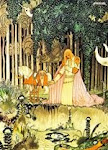Carson McCullers (1917-1967) published her first short story at the age of nineteen, and her first novel, the highly acclaimed The Heart is a Lonely Hunter, at the age of twenty-three. These are excerpts of some of her thoughts on writing, expressed in The Flowering Dream: Notes on Writing, an essay first published by Esquire in 1959:
"The dimensions of a work of art are seldom realized by the author until the work is accomplished. It is like a flowering dream. Ideas grow, budding silently, and there are a thousand illuminations coming day by day as the work progresses. A seed grows in writing as in nature. The seed of the idea is developed by both labor and the unconscious, and the struggle that goes on between them." ~ Carson McCullers
"I understand only particles. I understand the characters, but the novel itself is not in focus. The focus comes at random moments which no one can understand, least of all the author. For me, they usually follow great effort. To me, these illuminations are the grace of labor. All of my work has happened this way. It is at once the hazard and the beauty that a writer has to depend on such illuminations. After months of confusion and labor, when the idea has flowered, the collusion is Divine. It always comes from the subconscious and cannot be controlled." ~ Carson McCullers
"A writer's main asset is intuition; too many facts impede intuition. A writer needs to know so many things, but there are so many things he doesn't need to know -- he needs to know human things even if they aren't "wholesome," as they call it... I become the characters I write. I am so immersed in them that their motives are my own." ~ Carson McCullers
"It is only with imagination and reality that you get to know the thing a novel requires. Reality alone has never been that important to me. A teacher once said that one should write about one's own back yard; and by this, I suppose, she meant one should write about the things that one knows most intimately. But what is more intimate than one's own imagination? The imagination combines memory with insight, combines reality with the dream." ~ Carson McCullers
"The writer by nature of his profession is a dreamer and a conscious dreamer. How, without love and the intuition that comes from love, can a human being place himself in the situation of another human being? He must imagine, and imagination takes humility, love, and great courage. How can you create a character without love and the struggle that goes with love?" ~ Carson McCullers
The quotes are excerpted from the essay, as published in The Mortgaged Heart (Houghton Mifflin, c1971, c2005). To fully appreciate Carson McCullers' ideas, they should be read in their complete context, so I highly recommend locating a copy of this collection at your bookstore or local library.
I find Carson McCullers' ideas particularly compelling, because they validate my own writing methods and my contention that a true writer is an actor, inhabiting the characters she/he creates. I do not plan my work, but I think about it incessantly, imagining each scene as it progresses, breathing and living for each of my characters, letting them tell me what they will do next. Then, of course, comes all the revision, reliving each line, until you feel you've told your character's stories and all about their world in the best way you can, cutting out the repetition, revealing the core.
Subscribe to:
Post Comments (Atom)


No comments:
Post a Comment